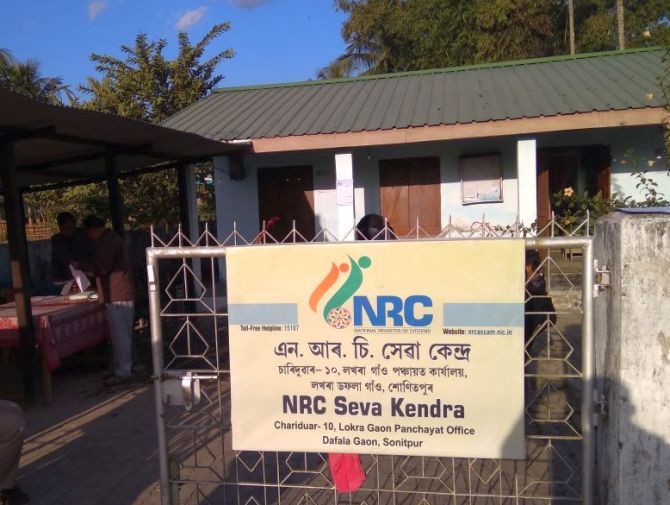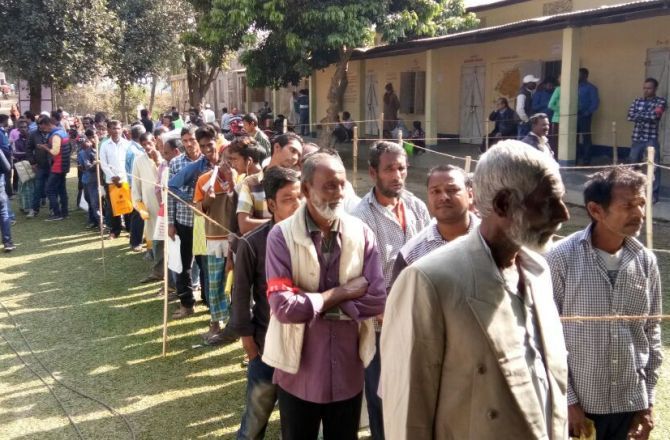The citizens’ register in Assam does not get to the bottom of things, reports Nibir Deka.

The part draft of the National Register of Citizens in Assam was released online at midnight on December 31 in accordance with the Supreme Court’s directive.
The next day people flocked to NRC kendras (centres) to check if their names were in the draft.
Security forces were deployed at every corner of the state and no untoward situation was reported.
However, a crack has appeared in the ruling alliance on this.
The ruling Bharatiya Janata Party’s ally, the Asom Gana Parishad, is unhappy about the contradictions between the NRC and the Citizenship Amendment Bill (2016).
But what is the NRC? Read on to find out.
Who is included in the first draft?
The first draft of the NRC has listed 1.9 crore people of the 3.29 crore applicants in Assam as legal Indian citizens.
The process of verification continues.
The authorities will take up verifying the 76 lakh people whose cases were kept in abeyance while the first part draft NRC was being finalised.
“We will place our progress before the Supreme Court on the date of the next hearing (February 20), and continue with our work in accordance with its directive,” said state NRC coordinator Prateek Hajela.
The issue of missing names
A total of 1.39 crore applicants did not find their names in the draft.
There are multiple reports of missing names within the same family due to documentation and data entry error.
Hajela has clarified that due to the complicated procedure, families may find names of certain members missing and such discrepancies will be addressed.
Some major names have failed to make it to the first draft.
Among politicians, Assam United Democratic Front chief and MP Badaruddin Ajmal, his brother MP Sirajuddin Ajmal, and BJP leader Shiladitya Dev’s name have not featured in the first draft.
Ajmal has responded calmly. Speaking to Protidin Times, he said: “Many VIPs have not been added (to the list). I am expecting my name on the next list.”
Assam Chief Minister Sarbananda Sonowal has clarified the matter and told PTI: “No one should have any apprehensions. If the name of a genuine Indian citizen is missing in the part draft of the NRC, he or she will get a proper chance to incorporate it.”
Brief history

Illegal immigration in Assam has been defined using the Assam Accord and the base year of 1971 without any religious categorisation.
According to the accord, all those foreigners who had entered Assam between 1951 and 1961 were to be given full citizenship, including the right to vote.
Those who had done so after 1971 were to be deported; the entrants between 1961 and 1971 were to be denied voting rights for 10 years from the date of detection but would enjoy all other rights of citizenship.
The politics of things
The NRC base year of 1971 is tricky for the BJP in terms of its Bengali Hindu vote bank and also to carry the agenda for the Citizenship (Amendment) Bill, 2016.
The bill is being reviewed by a joint parliamentary committee and is expected to be tabled in Parliament.
But there is a mismatch between the Citizenship Amendment Bill and the base year of the Assam accord and this threatens to undermine the NRC.
BJP North East Development Authority Convener and Assam Finance Minister Himanta Biswa Sarma summed up the government position: “We want Bengali-speaking Hindus to remain with the Assamese people. That is the BJP’s viewpoint. It has not changed. It has been the same, both before and after the elections,” said Sarma.
When he was asked if it was the BJP’s policy to differentiate between Hindu and Muslim migrants from Bangladesh, Sarma said: “Yes. After all, the country was divided in the name of religion. Thus, it is not a new thing.”
This guarantee of safeguarding Hindu Bengali interests was well received in the Barak Valley.
Aminul Haque Laskar, the lone minority BJP MLA, told The Sentinel: “Our party’s election manifesto has clearly spelt out protection and shelter to all those Hindu Bengalis who have had to desert their hearth and home under repression and oppression in East Pakistan, now Bangladesh, and forced to take shelter in this country.”

However, the AGP has refuted the claims of the election manifesto promise.
AGP leader Utpal Dutta told local TV channels: “They (BJP) did not show us the election manifesto before the elections.”
He further accused the BJP of doublespeak.
Responding to the allegations, Sarma said: “We have briefed them during our meetings and answered all their queries”.
How the BJP proposes to handle this hot potato remains to be seen.
The sticking point: Is there any difference between the National Register of Citizens and the Assam Accord?
The NRC is the registry of citizens, first done in 1951. This is an update on the registry.
However, the base year considered by the NRC is 1971, which was accepted when the agitation leaders of the All Assam Students Union and the All Assam Gana Sangram Parishad signed the Assam Accord with the Indian govt then, following the Assam agitation.
What is the difference between the register and the citizenship Bill?
The register considers people coming after 1971 as illegal immigrants.
The Citizenship Bill would provide exceptions to cases, mostly Hindus. And, the proposed base year will shift to December 2014 (if the bill is passed the next parliamentary session).
What is the difference between the AGP and the BJP on this?
The AGP wants 1971 to be the base year, while BJP leaders are backing the Citizenship Amendment Bill.










 © 2025 Rediff.com -
© 2025 Rediff.com -